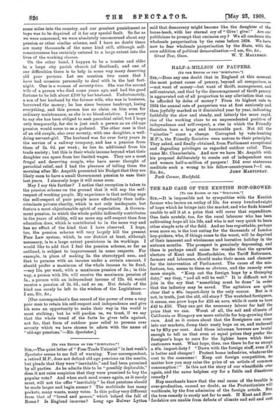MO THE EDITOR or THE "srsarsron."1 SIR,—The quiet letter of
" Free-Trade Unionist" in last week's Spectator seems to me full of warning. tour correspondent, a retired M.P., does not defend old-age pensions on the merits, but pleads that they were " inevitable," and had been promised by all parties. As he admits this to be " possibly deplorable," does it not raise suspicion that they were promised to buy the popular vote ? And when such need comes again, as it surely must, will not the offer "inevitably" be that pensions should be made larger and begin sooner ? The multitude has many pockets, many wants, many votes. Is this policy very different from that of "bread and games," which helped the fall of Rome ? Is England immune? Long ago Bulwer Lytton
said that democracy might become like the daughter of the horse-leech, with her eternal cry of " Give ! give!" Are our politicians to prompt that ominous cry ? We all condemn the wholesale pauperisation by the rates before 1834. We have now to fear wholesale pauperisation by the State, with the sure addition of political demoralisation.—I am, Sir, &c.,






































 Previous page
Previous page